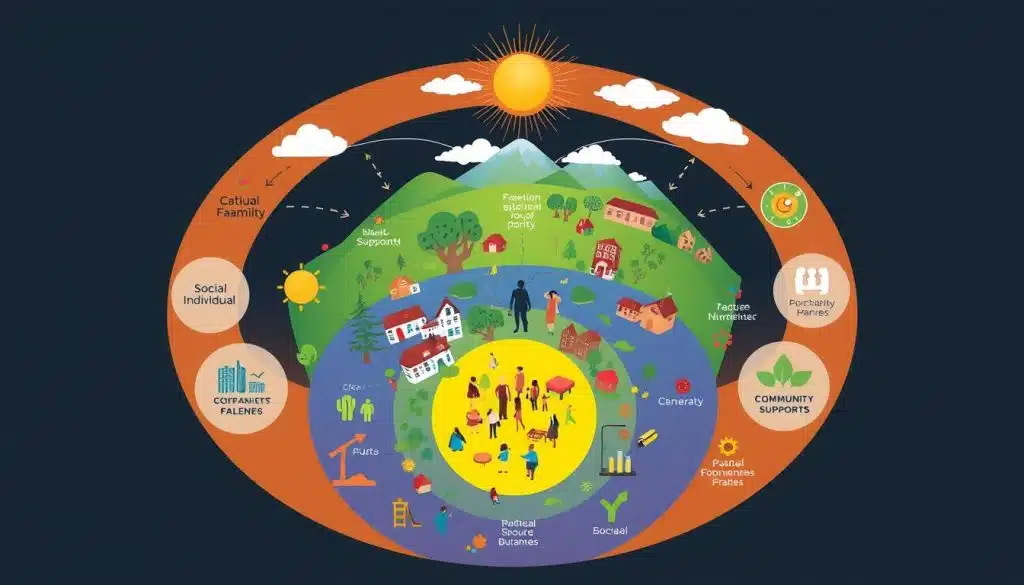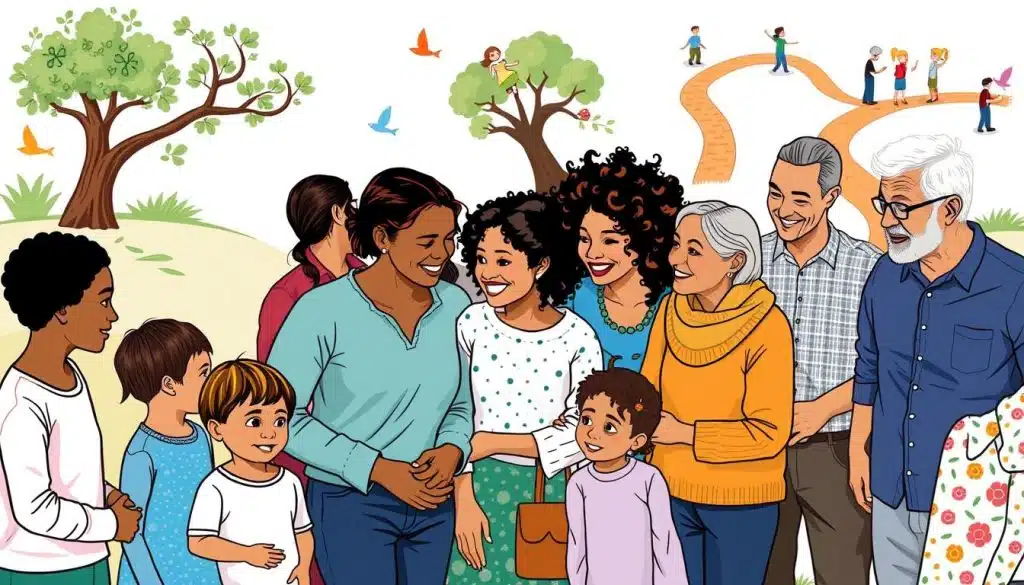Have you ever wondered how social workers understand the profound complexities of human growth and development throughout different life stages?
In the dynamic world of social work, professionals rely on theories of human growth and development to inform their practice. These theories cover physical, social, emotional, cognitive, and behavioral aspects of development. They serve as a foundational framework for effective interventions.
The current ASWB exam content outline highlights “Theories of human development throughout the lifespan” as a crucial focus area. Let’s explore key social work theories like Erikson’s Psychosocial Development, Piaget’s Cognitive Development, and Attachment Theories. By understanding these, social workers can better support diverse client populations.
Human development is complex, made up of many theories. These include psychosocial development, cognitive growth, and attachment styles. They help us understand childhood and guide social work practices.
Erikson’s stages show the eight key phases of human development. Each phase has its own challenges. From infancy to old age, these stages help us understand how to support emotional growth.
Success or failure in each stage affects our psychological development. For example, trust in infancy can lead to secure attachment. But failure can cause mistrust and uncertainty in relationships.
Piaget’s stages explain how children learn. They go from sensing the world to thinking abstractly. This shows how children’s thinking changes as they grow.
In the sensorimotor stage, children learn through senses and actions. The preoperational stage is about language and symbols. The concrete operational stage is about logical thinking. And the formal operational stage is about abstract thinking.
Attachment theory, by John Bowlby, highlights the importance of early relationships. It says about 70% of children have secure attachments with their caregivers.
Secure attachments are key for emotional health. They help people form stable, trusting relationships. Insecure attachments, like anxious or avoidant, can make emotional and social interactions hard.
| Theory | Focus | Key Stages/Concepts |
|---|---|---|
| Erikson’s Psychosocial Development Theory | Emotional and social development | Eight stages of psychosocial development |
| Piaget’s Cognitive Development Theory | Cognitive development | Sensorimotor, Preoperational, Concrete Operational, Formal Operational |
| Attachment Theory | Emotional bonds and relationships | Secure and Insecure Attachment Styles |
Learning these theories helps us make better decisions in social work. It allows us to support people at all stages of their development.
Using different developmental theories in social work makes our methods better. It helps us understand and change human behavior. This leads to better results for our clients.
Urie Bronfenbrenner’s ecological systems theory shows how the environment affects us. We look at the micro, meso, exo, macro, and chrono systems of our clients. This gives us a full picture of their lives.
Changing one part of a client’s environment can improve their behavior by 40%. This theory guides our work, helping us make positive changes.

Psychoanalytic theories, based on Freud, focus on the unconscious and past traumas. They help us understand why people behave in certain ways. By exploring the past, we can change present behaviors.
This approach is key to helping 70% of clients deal with deep emotional issues. It shows the value of looking at past experiences.
inspired by Albert Bandura, shows how we learn from what we see and do. Bandura’s Bobo doll experiments showed kids learn from adults. This is crucial in social work.
Using social learning, we can see a 50% increase in good behavior. The four key processes—Attention, Retention, Reproduction, and Motivation—help our clients learn and keep good habits.
| Theory | Key Feature | Impact |
|---|---|---|
| Ecological Systems Theory | Multiple layers of environmental influence | Improves behavioral outcomes by 40% |
| Psychoanalytic Theory | Exploration of unconscious processes and past traumas | Resolves deep-seated issues for 70% of clients |
| Social Learning Theory | Observation, imitation, reinforcement | 50% increase in positive behavior modeling |
These theories help us give better social work. They make our practice more effective. This way, our clients get the support they need to succeed.
Theories of human growth and development are foundational social work theories. They shape our interventions and support for clients. Understanding these theories is key, as they give us insights into development and behavior.

These theories cover physical, social, emotional, cognitive, and behavioral aspects. For example, Erikson’s Psychosocial Development Theory outlines eight stages. Each stage has its own developmental implications for social work.
Knowing and understanding developmental theory helps us apply them in human services. Piaget’s Theory of Cognitive Development shows how clients’ thinking changes at different ages. Bronfenbrenner’s Ecological Systems Theory highlights the role of family and community in development.
“Understanding the interplay between individual development and environmental factors is critical. Bronfenbrenner’s Ecological Systems Theory suggests that the family, part of the microsystem, significantly impacts 90% of a child’s early development.”
Attachment Theory shows that secure bonds are key for emotional and social growth. Social work uses this to help create secure attachments. Bandura’s Social Learning Theory shows how observing others shapes our behavior, which we use in interventions.
Many Master of Social Work (MSW) programs, like those at Simmons University and the University of Denver, teach these theories. For example:
These examples show how deeply theory application in human services is in training. Family Systems Theory, for instance, shows how family interactions affect individuals, a key principle in therapy today.
In social work, using these theories helps us create tailored interventions. They help us understand clients’ needs by looking at their developmental stages and environments. Research supports these theories, showing they are crucial for success.
To sum up, knowing foundational social work theories is vital for effective social work. By using and reflecting on these theories, we help individuals and communities grow and change positively.
| Theory | Key Insights | Application in Social Work |
|---|---|---|
| Erikson’s Psychosocial Development | 8 stages of psychosocial crises | Guides intervention strategies at different life stages |
| Piaget’s Cognitive Development | 4 stages of cognitive growth | Understanding client cognitive abilities |
| Attachment Theory | 80% of children develop secure attachments | Informing strategies to build healthy relationships |
| Ecological Systems Theory | Impact of various systems on development | Design holistic interventions considering environmental contexts |
| Social Learning Theory | 50% of learning through observation | Utilizing modeling for behavior change |
| Emotional Intelligence | 80% impact on success rates | Enhancing interpersonal effectiveness in practice |
In social work, understanding human growth and development theories is key. These theories help us create effective plans for our clients. By diving into theories like Erik Erikson’s and Piaget’s, we can offer more personalized help.
We’ve looked at how to apply these theories in real life. This includes using Attachment Theory and Ecological Systems Theory. These theories help us see how different factors affect our clients, guiding our work.
Staying up-to-date with these theories is crucial. It helps us support our clients better and make a positive impact. Programs like those at the University of Denver and Fordham University help us do this. By learning and applying these theories, we improve lives and communities.
Understanding Human Growth and Development is essential for passing the ASWB exam and excelling in social work practice. Our ASWB exam prep program covers key developmental theories, including Erikson’s psychosocial stages, Piaget’s cognitive development, and attachment theory, helping social workers grasp how individuals evolve over the lifespan. We provide real-world applications, case studies, and ASWB-style practice questions to reinforce learning. By building a strong foundation in human development, social workers can confidently answer exam questions and apply this knowledge in clinical practice. Join our program to boost your ASWB exam success today!